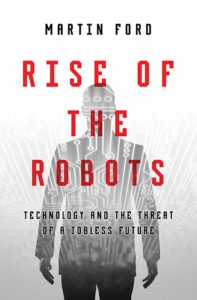I recently read Martin Ford’s Rise of the Robots with the UMD CS faculty book club. The book considers the impact of the growth of information technology (IT) on the human labor market, and how the trend towards greater automation could eventually eliminate a substantial number of jobs. The result could be a radical, and disruptive, reshaping of the global economy.
I would recommend the book. I found it well-written and thought provoking. Ford capably argues from past economic and technology trends and also digs into particular problems, products, and research in order to extrapolate future impact. Of the ten faculty who discussed the book, nine of us (including me) were convinced that future automation will be increasingly disruptive to human labor markets.
While reading the book, I found myself wondering about my own role, and that of my field, in addressing this situation we’ve contributed to. Many computer scientists have high-minded ideals and wish to help society through IT innovation. What can we do to ensure that those ideals are realized, rather than perverted into the dystopian future that Ford is warning us about? Continue reading
